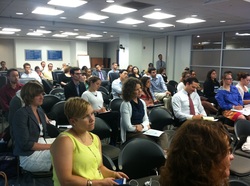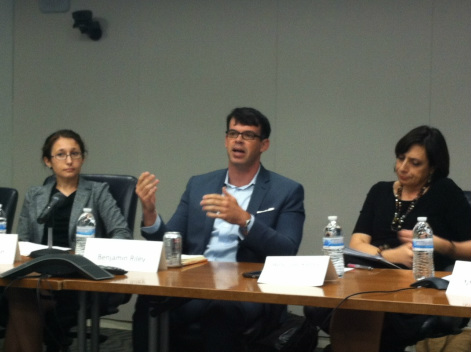The scorecards highlight colleges that are graduating teachers who are highly effective, specialized, and more likely to stick with the profession for more than three years. It shines a desperately needed light on teacher preparation, one that panelists pushed for during a YEP-DC event panel this month. The event, called “Teaching the Teachers,” invited experts, researchers, and practitioners to weigh in on the all-important goal of strengthening teacher training across the nation.
Or maybe it could be all of the above.
To fully understand the world of teacher preparation programs, it’s important to consider its sheer size. There are thousands of programs and various routes to certification, from traditional college instruction to alternative credentials offered through groups like Teach For America. Because teacher preparation programs aren’t held to universal standards or accountability measures, the quality of programs, content, and requirements for graduation vary widely. A recent report (and handy consumer tool) from the National Council on Teacher Quality (NCTQ), Teacher Prep Review, helps parse out these differences in its evaluation of more than 1,100 preparation programs across the nation. Marisa Goldstein of NCTQ, also one of the panelists, said the report highlights important principles for schools to adopt in the areas of selection (of candidates), content preparation, professional skills (how to teach), and outcomes.
Regardless of where the panelists’ sided on the teacher preparation debate, one thing was for certain: Teacher training standards need revamped. Some organizations have drafted standards, including the Council for the Accreditation of Educator Preparation (CAEP) and the American Federation of Teachers (AFT), but programs aren’t necessarily forced to adopt them. One standard pushed by CAEP, for example, calls on teacher preparation programs to use data to drive their content and methods. Teacher preparation programs should track their graduates’ progress once they’re in the classroom, said Benjamin Riley, a panelist at the event and former CAEP board commissioner, and use student achievement and other performance measures to gauge how well their graduates are prepared for the classroom. Another panelist, Marla Ucelli-Kashyap, of AFT, said data use shouldn’t end there; candidates should be assessed prior to entering a teacher prep program, much like lawyers are when they take the bar exam. AFT advocates for a bar-like assessment for educators, one that tests proficiency in teaching skills and competency in subject matter. And Ucelli-Kashyap says stringent assessments should continue throughout teacher training and before candidates enter the classroom. “You can’t just push on one lever (in the teacher prep pipeline) and expect the whole system to change,” she said.
Another area for consideration is the reallocation of resources used to train and support teachers. Some of the panelists suggested shifting funds from preparation programs to the classroom, enabling new teachers to partner with a mentor or master teacher in a residency-style program. Alexandra Fuentes, a panelist and a biology teacher at Cesar Chavez Public Charter School, said she didn’t have a mentor to help her transition into the classroom after her training at the Harvard Graduate School of Education. A mentor could have demonstrated the techniques she learned in school, she said, as well as provide feedback on how well she executed them herself. Now, Fuentes is a Teach Plus Teaching Policy Fellow in a 16-month program that exposes experienced teachers to best practices in the classroom, as well as advocacy strategies to effect change in education policy at the local and state level. Fuentes wants to increase teacher voice in ongoing policy discussions because, she says, teachers should have a say in policies that affect them; teachers would understand policy intentions more clearly, and it could increase buy-in when new policies are implemented.

YEP-DC thanks the American Institutes for Research for donating the space to host this event.
Layla Bonnot is an education policy researcher with a focus on K-12, state-level issues. She can be reached at laylabonnot(at)gmail(dot)com.


 RSS Feed
RSS Feed